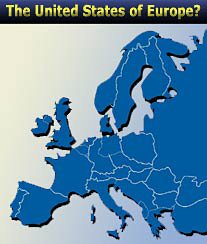Common European Values? Let’s create them! Part 1
 Oh boy.
Oh boy.This is the first official posting for the EuroBlog and we’re already in trouble.
This week’s EuroQuest asks what are European Values (hereafter to be known as EVs)? As if there is such a thing. As if we can collectively point to the map of the continent and say, “Yes, all the people who live in this part of the world believe in civil rights, open societies, the separation between church and state, secular humanist morals and the social welfare state.” This is simply not so.
Former EU Commission President Romano Prodi, bless him, went in search of EVs in 2002. He hired 12 great European thinkers and asked them to find this elusive thing called “European Identity.”
They failed.
In the end, one of the wise men said, “Every attempt to codify European values is inevitably confronted by a variety of diverging national, regional, ethnic, sectarian and social understandings”. In other words, we’re simply too different, in every way, to go around generalizing about what it means to be European. Look at the results of the French “Non” and the Dutch “Nee” to the European Constitution. If you can make the pro Europe Dutch say no, something has really gone wrong.
The “Atlas of European Values” is a comprehensive tome answering every question from which European country is the most secular, to which is the happiest. A brief glance through this book shows that the only generalization you can make about Europeans is that we are really, really different in every way.
So what are the consequences of this? Answer: If we can’t define our “Europeanness” from the inside out, we go around looking for someone to which we can compare ourselves. Luckily for us, the only remaining superpower in the world happens to be a federation of states laden with geographical, historical and religious differences: the US. Unfortunately for us, they patched up most their most serious differences about 140 or so years ago. America is a cohesive nation where most people speak the same language, watch the same TV and get the same cultural signals in schools that more or less offer the same curricula and teach the same ideas about civic values. Oh boy. We don’t do any of that. Blue state or red state, they all share the same sense that, as a nation, they share the same history and, more importantly, the same destiny. Double oh boy. “And if you come from somewhere else, don’t worry, we all are. We’ll make an American of you yet.” Triple oh boy.
It is not alarmist to say that we simply must get over our past and believe, as do the Americans, that Europe, whole and unified, is our version of manifest destiny. (But then without all that nasty killing of native cultures.) Former German Chancellor Helmut Kohl once stated that the European Union is the difference between war and peace on the continent. I don’t often quote Kohl, but on this he’s dead right.
But I've got a way to fix this.
More on Friday!!!!!!
(By the way, you can comment on this posting by clicking just under this sentence.)

3 Comments:
I have to say, for me one of the great things about being European is that we are all different, and that we can accept that -- of course that some people don't accept that also defines being European!
One of the most basic European Values is still, I think, one of the oldest (in EU terms, that is): a desire for Peace. Few people here without that desire describe themselves as European.
But no doubt about it, overall, defining "European Values" is not something that can give simple consensus.
Hi Connor,
Thanks for your response. Yeah, it's those most peaceful of Europeans who believe in a united Europe. Tune in on Friday for the conclusion of my grand European scheme.
Europe is made up of many different countries with everybody sometimes having the same or similar tastes and other times differing from eachother.
I think that this is like America. Like Europe, the above applies.
Thank you very much.
Sincerely,
Ludwig Messer
Post a Comment
<< Home